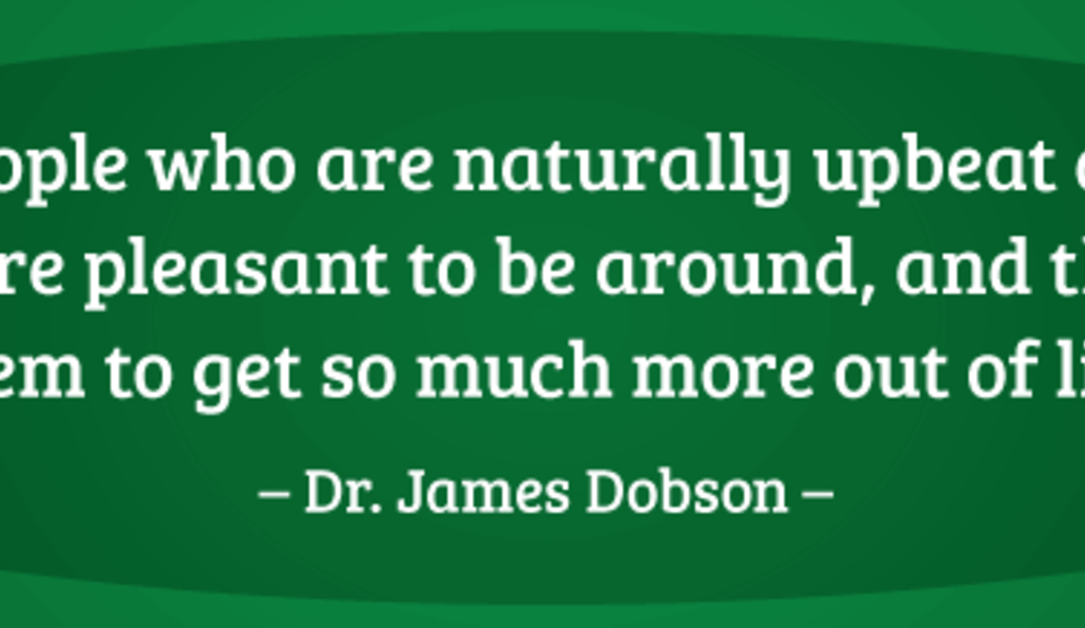Positive thinking can be a good thing. People who are naturally upbeat are more pleasant to be around and they seem to get so much more out of life. They are also more productive than those who are routinely "down" and discouraged.
But negative thinking has its advantages, too. It is negative thinking that leads me to buckle my seat belt when I get in a car. I might be hurt in a collision if I don't strap myself in. It's negative thinking that causes me to buy life insurance to protect my family. I could die suddenly and leave my loved ones in financial difficulty. It's negative thinking that encourages me to avoid behavior that could be addictive—such as using illicit drugs, alcohol, or pornography. There are millions of other examples of what might be called "beneficial negatives."
The bottom line is that there is power in any kind of legitimate thinking. Indeed, if a person only allows himself to read or hear positive messages, he will have to skip over at least half of the Scriptures. Jesus said some of the most profoundly negative words that have ever been uttered, including the prospect of unregenerate people entering eternity without God. Yet His message to a lost and dying world is called the gospel, meaning "good news."
The interesting thing about positives and negatives is that they produce the greatest benefit when they work in concert.
For example, if you place an electrical cable on the positive post of a car battery, nothing will happen. You can put it in your mouth if you wish, but there will be no power. If you take that cable off the positive post and put it on the negative, still there will be no charge. But what happens when you hook the cables to both the positive and the negative posts and then touch the contact points? Your hair will curl, if you have any left.
That principle, bringing positives and negatives together, is illustrated again and again in Scripture. Consider this passage from the book of Isaiah: "'Come now, let us reason together,' says the Lord. 'Though your sins are like scarlet, they shall be as white as snow; though they are red as crimson, they shall be like wool'" (Isaiah 1:18). What marvelous imagery this is of God's love and forgiveness. Yet four chapters later Isaiah wrote some terrifying words under divine inspiration: "Therefore the Lord's anger burns against his people; his hand is raised and he strikes them down. The mountains shake, and the dead bodies are like refuse in the streets. Yet for all this, his anger is not turned away, his hand is still upraised" (Isaiah 5:25).
This balance between compassion and judgment appears from Genesis to Revelation. It moves between Creation and the Fall, between condemnation and forgiveness, between the Crucifixion and the Resurrection, between heaven and hell. The greatest example is found in the book of Isaiah, where the wonderful prophecies of the coming Messiah appear intermingled with dire predictions of the destruction of Israel. Both proved accurate.
Learning to balance the intersection between these two forces is especially useful to the understanding of children. There's a time for affirmation, tenderness, and love. They nourish the spirit and seal the bond between generations. But there's also a time for discipline and punishment. Moms and dads who try to be eternally positive, ignoring irresponsibility or defiance in their children, fail to teach them that behavior has consequences. But beware!
Parents who are continually punitive and accusatory can create serious behavioral and emotional problems. The apostle Paul recognized this danger and cautioned dads not to get carried away with discipline. He said, "Fathers, do not exasperate your children; instead, bring them up in the training and instruction of the Lord" (Ephesians 6:4). He mentioned the warning again in Colossians 3:21: "Fathers, do not embitter your children, or they will become discouraged." Remember that Paul also said emphatically to children, "Obey your parents in everything, for this pleases the Lord" (Colossians 3:20). What great wisdom there is in those convergent passages.
I address this issue of balance in discipline because it holds the key to the entire parent-child relationship. Frankly, remaining in the safety of the middle ground as moms and dads is difficult to achieve. None of us does it perfectly. But the best parents are those who steer a path between permissiveness and authoritarianism.
From Dr. Dobson’s book Bringing Up Boys.












